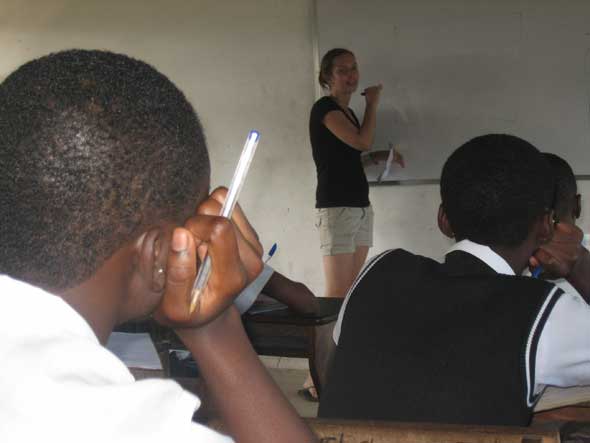Project gives amateur journalists a voice
Voices of The World is an online newspaper and magazine created by international volunteer organisation Projects Abroad thats aim is to encourage aspiring journalists to express their views and opinions.
 [/media-credit]
[/media-credit]
- Students from Accra High School’s Voices of The World workshop get a lesson in photo journalism
With the importance of the media’s role in society continuing to grow there is one online global initiative that is encouraging aspiring journalists to express their views and opinions.
Voices of The World is an online newspaper and magazine created by international volunteer organisation Projects Abroad, and is incorporated into the journalism placements they have on offer.
It originated in Romania and now has branches set up across the globe, including in Ghana in West Africa.
The aim of Voices of The World is to give students under the age of 25 the opportunity to learn about all the facets of journalism including ethics and writing styles, as well as presentation through platforms such as print, audio and visual.
Ghana’s Projects Abroad Journalism Manager and Voices of The World Coordinator Samuel Polley said, “it also gives the students a chance to write articles, the best of which will be published on the website.”
“Here in Ghana I also aim to publish the articles in a local newspaper,” he said.
The cost free workshops are set up for local students interested in journalism and are supervised by a member of staff with media experience.
Additionally, the students are taught by and paired up with Projects Abroad journalism volunteers in order to enhance their experience and skills base.
“We run weekly workshops in which the students are either taught a subject or we work on their articles,” said Mr Polley. “At the end of the year we will have a changeover of students to make sure that many get to benefit.”
Ghana’s Voices of The World workshop is run in conjunction with Accra High School and this years group consists of 12 students.
“They have tackled each task very well and enthusiastically and I have seen a great improvement in most of the students,” said Mr Polley. “They have taken on board all they were taught and put it into practice.”
Monika Fidler, a Projects Abroad journalism volunteer working with Voices of The World said, “I was with the Accra High group for eight weeks and by the end I had seen a major improvement in their work.”
“It really was incredible to just watch them learn and then apply that new knowledge to the development of their stories,” she said.
Issues covered in the workshops and subsequently written about by the students include reasons for and against the outlawing of female genital mutilation, the plight of football referees in Ghana, environmental degradation, domestic violence and the stigmatisation of HIV/AIDS victims.
“The students are very up to date with current affairs here in Ghana and this diverse set of topics often leads to heated debates within the class,” Mr Polley said.
Ghana is one of a handful of African countries that is supposed to have free and open journalism however this is not always the case he said.
“There are a lot of incidents of censorship as well as lazy journalism, which is apparent when reading a newspaper.
“Voices of The World gives the students the opportunity to know from an early stage what responsibilities a journalist has as well as showing them some of the difficulties of being a journalist in Ghana from firsthand experience.
“It is the volunteers from around the world that run these workshops and can give experience from overseas as well as their views on their time in media houses here.
“I encourage the students to try and push the boundaries of journalism and not just fit into the system that is already there.”
